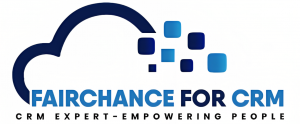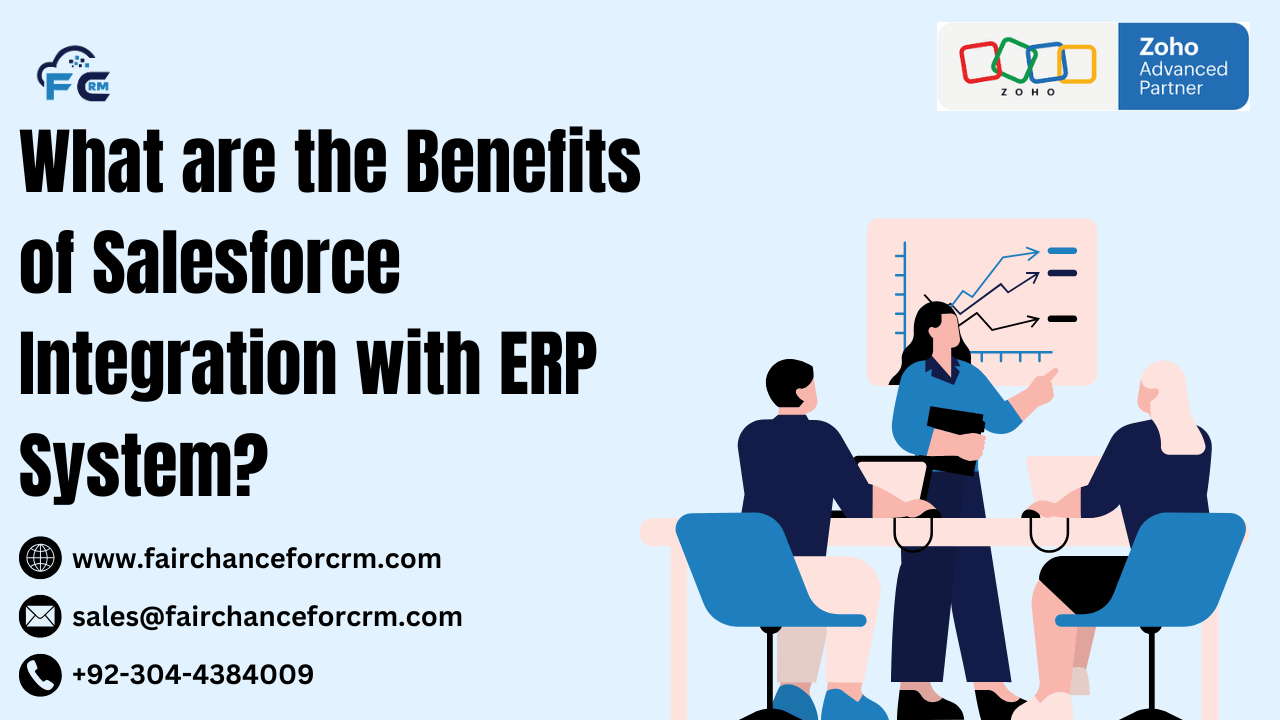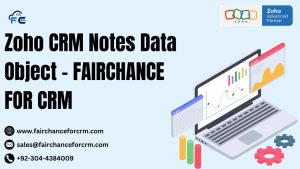What are the Benefits of Salesforce Integration with ERP System? Integration solutions are become more and more popular among companies trying to streamline operations and increase corporate efficiency. Integrating Salesforce, a top customer relationship management (CRM) platform, with an enterprise resource planning (ERP) system is one such effective pairing. Through this connection, companies can link their back-end operations and front-end client relations, resulting in a streamlined and effective ecosystem.
This article analyzes the enormous benefits of Salesforce integration with ERP, demonstrating how this synergy may alter operations, enhance productivity, and improve data accuracy. Now discuss the Benefits of Salesforce Integration with ERP System.
Also Read:
- How to Choose the Best Zoho Implementation Partner?
- How to Secure Your Online Accounts Using Zoho Vault and Zoho OneAuth?
- How CRM Solutions Drive Client Growth for Mortgage Businesses?
- Zoho Mail vs. Gmail: Which One Should You Choose?
- 9 Exclusive Benefits of Salesforce CRM
What are the Benefits of Salesforce Integration with ERP System?
No, Salesforce is not an ERP system. While it offers extensive capabilities to manage customer-facing aspects of a business, it does not handle core back-office operations such as finance, supply chain, or inventory management, which is typically managed by ERP systems.
However, integrating Salesforce with an ERP system provides the best of both worlds. Businesses can manage customer data, sales pipelines, and marketing campaigns through Salesforce, while their ERP system takes care of accounting, procurement, inventory, and other business operations.
Benefits of Salesforce Integration with ERP System
Integrating Salesforce with your ERP system offers a wide range of advantages. Let’s dive into the specific benefits:
1) Streamlining Business Processes
One of the most significant benefits of integrating Salesforce and ERP is the streamlining of business processes. By doing away with departmental silos, this integration permits information to move freely throughout the company.
- Low Data Loss Risk: Data silos can cause miscommunication and errors. By ensuring that all departments operate from the same set of data, Salesforce and ERP integration lowers the possibility of losing crucial information.
- Synchronized Workflow: With both systems connected, different teams from sales to finance can collaborate more easily, ensuring smooth transitions between front-end and back-end tasks.
- Seamless Communication: Better departmental communication, such as that between the sales and inventory teams, is fostered by integration and contributes to the efficient and well-informed decision-making process.
- Informed Decision-Making: Teams have access to real-time data, ensuring that they can make decisions based on the latest information, which enhances overall business performance.
2) Enhanced Data Accuracy
Maintaining data integrity is essential for smooth operations. By integrating Salesforce with an ERP system, companies can ensure more accurate data and eliminate inconsistencies that often result from manual data transfers.
- Minimization of Errors: Manual data entry is prone to mistakes, but with Salesforce ERP integration, much of the data transfer is automated, significantly reducing errors.
- Reduction of Manual Data Entry: Data from customer interactions in Salesforce can be automatically synced with ERP systems, reducing the need for manual data input.
- Accurate Reporting: Reporting becomes more precise as the integration ensures that all data is up-to-date across both systems.
- Consistency Across the Organization: By integrating the two systems, data consistency is maintained, ensuring all departments are working with the same information.
3) Improved Customer Experience
Salesforce integration with ERP systems allows businesses to gain a complete view of their customers, resulting in an improved customer experience. By combining data from Salesforce and ERP, companies can offer more personalized services and respond faster to customer inquiries.
- Integration of Customer Data: Customer information from Salesforce, such as preferences and history, is combined with ERP data like order status and invoices, giving a 360-degree view of each customer.
- Personalized Experiences: Businesses can tailor communications and offerings to customers based on a complete understanding of their preferences and past interactions.
- Faster Response Times: Sales and support teams can access real-time data on orders, inventory, and account history, allowing them to address customer inquiries more quickly.
- Enhanced Customer Satisfaction: A quicker, more personalized service enhances the overall customer experience, leading to higher satisfaction and retention rates.
4) Efficient Order and Inventory Management
For companies dealing with products, efficient order and inventory management is crucial. Integrating Salesforce with ERP systems enables real-time updates on orders and inventory, improving fulfillment and reducing errors. So this is What are the Benefits of Salesforce Integration with ERP System?
- Accurate Order Promises: With access to real-time inventory data from the ERP system, the sales team can give accurate delivery timelines to customers.
- Optimal Inventory Levels: Integration helps businesses maintain the right amount of stock, ensuring that they meet customer demand without overstocking or understocking.
- Error Reduction: Automated order processing reduces human errors that might occur when transferring data between systems.
- Supply Chain Optimization: Integration allows for better supply chain management, as ERP data helps identify bottlenecks or inefficiencies, enabling dynamic responses to changes in demand.
5) Seamless Financial Management
Integrating Salesforce with ERP brings seamless financial management by syncing sales data directly with financial records, improving accounting accuracy and visibility.
- Accurate Financial Reporting: Sales figures from Salesforce are automatically reflected in the ERP system, ensuring financial reports are always up-to-date.
- Real-Time Financial Visibility: Integration helps finance teams make strategic decisions by providing them with real-time insights into the company’s revenue streams.
- Improved Revenue Recognition: Syncing sales data with financial records helps ensure that revenue is recognized accurately and in compliance with financial regulations.
- Enhanced Financial Analysis: In order to improve strategic planning, financial teams should leverage insights from operational and sales activities to conduct more effective data analysis.
6) Data-Driven Analytics
Data-driven analytics becomes much more powerful when customer data from Salesforce is combined with operational data from the ERP system. Gaining deeper insights into customer behavior and business performance is made possible by this extensive dataset.
- Combined Customer and Operational Data: An integrated picture of the business is produced by combining operational data from the back end with sales data from the front end.
- Identification of Trends and Patterns: Businesses may identify trends and patterns in customer behavior and operational procedures thanks to the consolidated dataset, which helps them make better decisions.
- Informed Decision-Making: Advanced analytics tools can be used on this integrated data to make decisions that are not only data-driven but also more strategic and future-oriented.
- Long-Term Strategic Planning: With accurate data from both Salesforce and ERP, businesses can make more informed decisions that support long-term growth and success.
7) Increased Productivity and Efficiency
An integrated Salesforce and ERP system eliminates the need for duplicate data entry, automating many manual tasks and leading to a significant boost in productivity and efficiency.
- Employee Focus on Strategic Tasks: By automating routine data transfer tasks, employees can focus on more strategic, value-added activities.
- Enhanced Productivity: Automated processes reduce the time and effort required for day-to-day operations, allowing teams to accomplish more in less time.
- Improved Agility: A more efficient, productive organization is also more agile, able to adapt quickly to changes in the market or customer demand.
8) Scalability and Future-Readiness
As businesses grow, they need systems that can scale with them. ERP and Salesforce integration offers the scalability and flexibility needed to adapt to changing business needs.
- Ability to Scale Operations: Integration allows businesses to easily scale operations as they grow, without the constraints of disconnected systems.
- Incorporation of New Technologies:In a business environment that is changing quickly, integrated platforms can more readily adopt new technologies like artificial intelligence (AI) and machine learning to remain competitive.
- Expansion of Offerings: Businesses can expand their product or service offerings without worrying about managing multiple disconnected systems, ensuring a smooth transition.
Integrate Salesforce & ERP System With Us!
Integrating Salesforce with ERP is a wise decision that can drastically change the way your business operates. This will boost data accuracy, expedite processes, and enhance customer satisfaction.
But the integration process can be tricky, needing professional advice and customized solutions.
Partner with us for a seamless Salesforce-ERP integration that is customized to your business’s specific needs. By utilizing our skills, you’ll be able to fully utilize both systems and make sure they complement one another to advance your company.
FAQs about Benefits of Salesforce Integration with ERP System?
- What is Salesforce ERP integration? Salesforce ERP integration connects Salesforce CRM with ERP systems to streamline data sharing between front-end customer operations and back-end business processes.
- Can Salesforce handle ERP functions? No, Salesforce is not an ERP system, but it can integrate with ERP solutions to handle back-office functions like inventory, finance, and supply chain management.
- What are the challenges of Salesforce-ERP integration? Data consistency, integration complexity, and guaranteeing smooth communication between the two systems are major obstacles.
- How long does Salesforce-ERP integration take? The time frame varies depending on the complexity of the systems and customization requirements, but it typically takes several weeks to a few months.
- What are the best practices for successful Salesforce-ERP integration? Clear goal-setting, collaborating with knowledgeable partners, maintaining data consistency, and long-term scalability planning are examples of best practices.
For more information about the What are the Benefits of Salesforce Integration with ERP System? visit this link.
If you want to Free Trail Zoho, click on this link.




